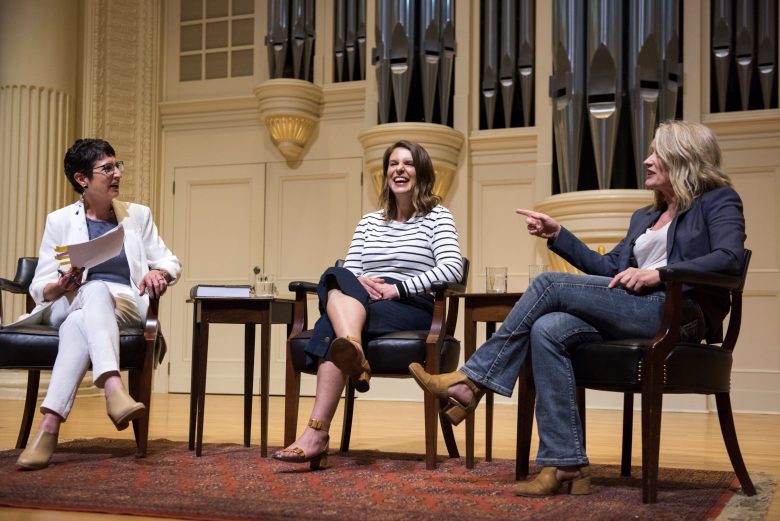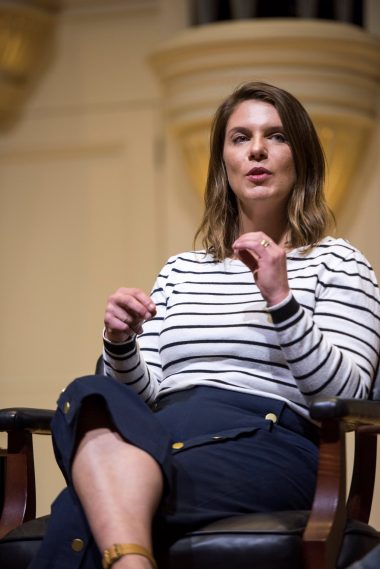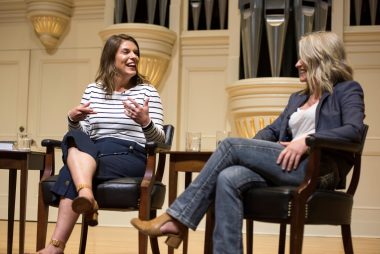The April 11 discussion in Whitley Auditorium moderated by Marcie Cohen Ferris of the University of North Carolina at Chapel Hill focused on the hit PBS show and its portrayal of the food, culture and communities of eastern North Carolina.

When chef Vivian Howard and director Cynthia Hill began work on what would become the hit PBS program “A Chef’s Life,” they were focused on ensuring that they created “reality TV” that was actually real.
 That meant providing an unvarnished look at Howard and Chef & The Farmer, the restaurant in Kinston, N.C., that Howard started in 2006 with her husband, Ben. That meant a sincere look at the real people who make up the communities within Kinston and eastern North Carolina. And that meant providing real insight into the food and ingredients that are interwoven into the culture in this corner of the American South.
That meant providing an unvarnished look at Howard and Chef & The Farmer, the restaurant in Kinston, N.C., that Howard started in 2006 with her husband, Ben. That meant a sincere look at the real people who make up the communities within Kinston and eastern North Carolina. And that meant providing real insight into the food and ingredients that are interwoven into the culture in this corner of the American South.
“The show — it isn’t a food show,” Howard told the crowd gathered in Whitley Auditorium Thursday night. “It’s a show about community and people. It’s about all those things, told through the lens of food.”
Joined by moderator Marcie Cohen Ferris, a professor at the University of North Carolina at Chapel Hill, Howard and Hill provided a look behind the scenes of “A Chef’s Life” and how its themes resonated with millions of viewers during its five-season run on PBS. The April 11 discussion was this year’s James P. Elder Lecture, an annual endowed lecture series devoted to the exploration of critical scholarship and its impact on the public forum.
Howard and Hill both grew up outside of Kinston, and reconnected after Howard had moved back to the area from New York City to start Chef & The Farmer. The success of the restaurant in its early years coupled with a passion for storytelling prompted Howard to reach out to Hill, who had seen success as a documentary filmmaker, to talk about a show based on the disappearing food traditions of eastern North Carolina.
Their early effort was dismissed by many as “unprogrammable” because it didn’t fit into a single category as a documentary, a food show or a reality show, Hill. “We were really excited about creating something new and something you wouldn’t typically see on the Food Network,” Hill said.
Their persistence through initial rejections would land the show a national spot on PBS and begin a 60-episode run, with 4.5 million viewers tuning in at its peak. Generally, each 30-minute episode focused on a key ingredient in Southern cooking and how that ingredient made it way from the farm to the table, all set against the backdrop of Howard’s family and successful restaurant. Howard’s candor throughout the show was key to its success, Hill said.
 ”Vivian is Vivian, and she rarely tries to edit herself,” Hill said, eliciting a laugh from Howard. “She doesn’t perform, and I think that’s why the content is what it is. I think that’s why the audience has really grown to trust her.”
”Vivian is Vivian, and she rarely tries to edit herself,” Hill said, eliciting a laugh from Howard. “She doesn’t perform, and I think that’s why the content is what it is. I think that’s why the audience has really grown to trust her.”
The success of the Chef & The Farmer and then the following success of “A Chef’s Life” generated in Howard a sense of local and regional pride that she hadn’t felt, either as a Southerner living in New York, or as a one who returned to her community and her roots. Viewers connected with the specific dishes and foods she featured on the show, or saw parallels with the foods that played such important parts in their lives and personal histories, Howard said.
“I didn’t know it would have this effect on people,” Howard said. “I started to see people in our region, and they would say, ‘Gosh, that made me feel so prideful of my mom’s chicken and rice. My mom always made that, and I didn’t know it was a thing.’ You can see that people had a little bit of pride in something that had been so mundane to them, and it gives you pride in yourself.”
Hill said people don’t have to be from North Carolina or the South to connect with the show. “It is so interesting and rewarding to have these people from all over the country and internationally respond to this show,” Hill said. “Everyone can relate to something their grandmother made for them for the very first time. Even though the food may not be something they’ve experienced before, they understand the emotion behind it.”
“A Chef’s Life” concluded in October with an hour-long finale, but Howard and Hill are already working on their next project, a show called “South by Somewhere” that focuses on people from other countries or cultures who have moved to the South and made it their home.
“Everyone says we bring our food and our language, and those are the things that keep us grounded as the people we are,” Howard said. “Food is so specific. It is so much of our identity, but it’s also something that we all share. It’s a common language.”
Earlier in the day, Howard and Hill met with Alamance Burlington School System students how are participating in the system’s Culinary Arts program and Howard signed copies of her book, “Deep Run Roots,” outside McEwen Dining Hall.
The lecture series is named for James P. Elder, who served on the history faculty of Elon (1963-1973) and was advisor to the Liberal Arts Forum, which he founded as an undergraduate. Thirty years after he left Elon for the Folger Library in Washington, D.C., a group of Forum alumni established an endowed lectureship in Elder’s honor. More than 150 former students and friends have contributed to the Elder Lectureship in tribute to Elder’s example of faculty-student engagement.


